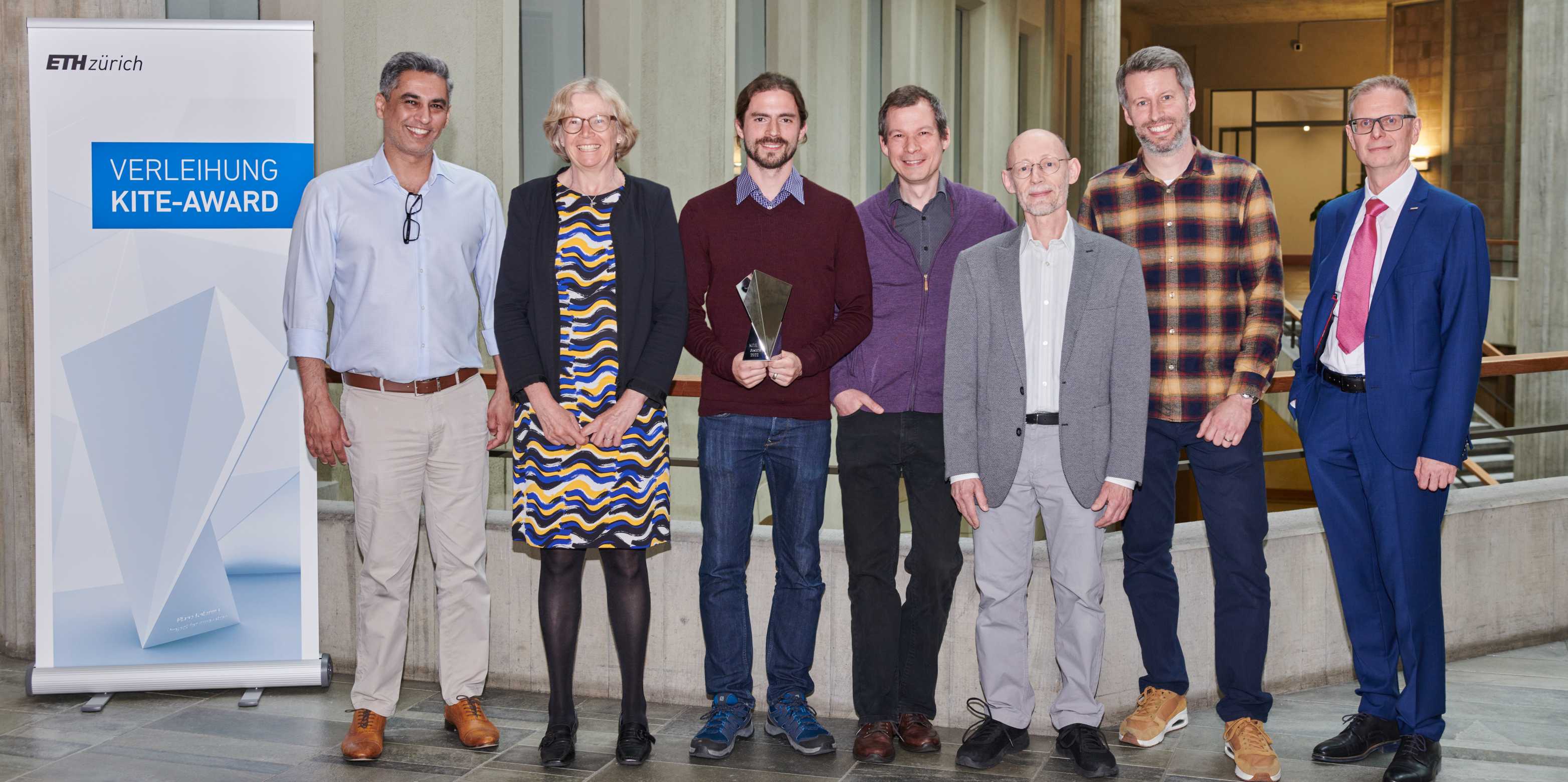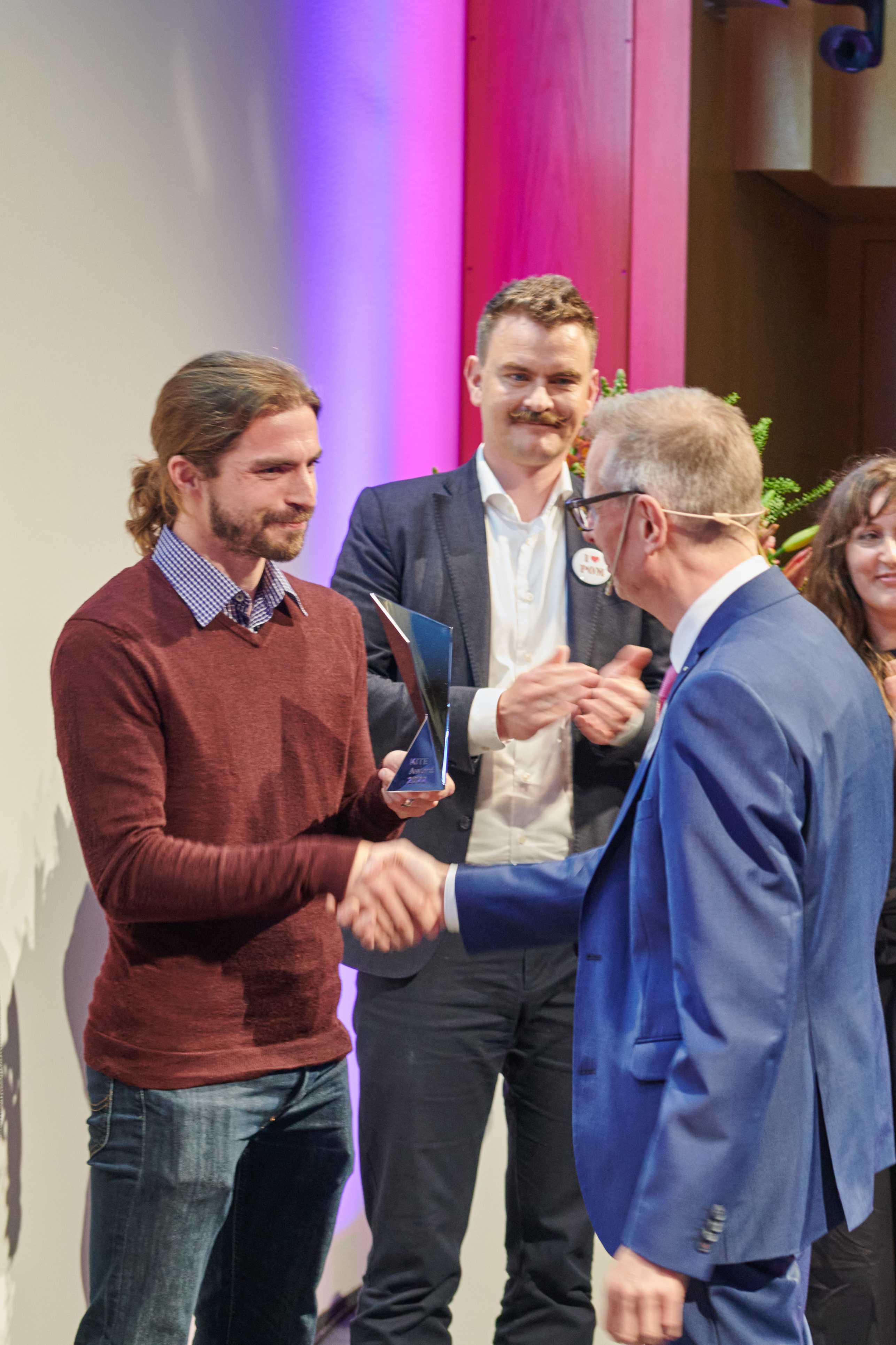KITE Award for physics experiments at home
This year’s ETH award for particularly innovative teaching projects goes to a course that brings physics experiments for students right into their home. The project was up against 24 others competing for the KITE Award 2022.

ETH conducting physics experiments with a tin of potato crips? “Many things we could never have imagined suddenly became possible during the pandemic,” Günther Dissertori, Rector of ETH Zurich commented at the presentation of the KITE Award 2022. The ETH Zurich Lecturers’ Conference presents the award every two years to honour outstanding teaching innovations. This year’s prize went to the developers of a physics experiment for Bachelor’s students.
The experiment with the tin was just one of many that Andreas Eggenberger, Head of Physics Experiments Course, and his team developed in March 2020 when the labs were shut and the only shops open were those selling essential goods. Using the tin, a slot created by two razor blades, a CD and a smartphone, students working at home measured the wavelength of light from different sources. In other experiments they used a water bottle to determine the speed of sound, or sunglasses to verify Malus’s law, which describes the intensity of light behind a polarisation filter.
All the experiments could safely be performed at home and produced results that could be scientifically assessed, while delivering virtually the same didactical value as experiments usually carried out in the laboratory. The project was up against 24 other nominees competing for the KITE Award 2022.
Organising their own experiments
The fact that students had to plan, construct and carry out everything themselves at home for the Physics Lab 2020 changed the course, says Eggenberger: “Suddenly physics became part of students’ everyday lives, which produced a completely different mode of engagement.” If there were problems in setting up an experiment, this also gave them a deeper understanding of the experiment itself.
The new series of experiments were therefore kept in the curriculum even when the labs on campus opened again. The lecturers even plan to develop new, more openly designed experiments along the same lines. Their intention is to replace traditional, ready-made experimental setups with a collection of instruments and tools more in the form of a workshop, which the students have to use to develop their own experimental approach.
Another interesting aspect of the course is that it does not require complicated technology, says Ulrike Lohmann, President of the Lecturers’ Conference which presents the award every two years. “The simpler the materials, the more effectively the pedagogical and didactical benefits of the course can be applied to other disciplines and departments. Courses such as these can have a lasting impact on the development of teaching at ETH Zurich.” The other two projects shortlisted for the final of the KITE Award have similar potential.

During the time when all lectures were conducted via Zoom, ETH Professor Torbjørn Netland and his team developed a new online concept for his introductory course “Production and Operations Management”. Over the course of 44 five-to-ten-minute tutorials, Netland and his team set out to explain the most important concepts and principles in production management. “Our goal was to produce informative, entertaining and lively videos that students enjoy watching,” says Netland. To do so, his team recorded short lectures interlaced with questions, pop-up graphics, audiovisual elements and a good pinch of humour.
There were also virtual visits to factories and production facilities. Netland and his team produced the relevant VR content themselves. Using cheap VR goggles and a smartphone or computer, students could visit real factories operated by the company Hilti. They were able take a virtual tour through the production halls and solve realistic production problems at different stations. They won points for doing so, just like in a video game.

Teaching quadrocopters to fly autonomously
In the course “Quad-rotors: Control and Estimation” run by ETH Professor John Lygeros, Bachelor’s students in the Department of Information Technology and Engineering (D-ITET) are able to deepen and apply their theoretical knowledge of control systems in the laboratory. Their task is to work in a small team on the development of their own control system that allows a tiny drone, or quadrocopter, to fly autonomously.
During the lockdown Jeremy Coulson and Paul Beuchat quickly adapted the quadrocopter’s hardware and developed new software and online teaching resources to allow remote teamwork and supervision. They sent students a package with a modified quadrocopter and newly developed plug-and-play software. This gave them the hardware they needed to carry out experiments at home. “At the same time, our goal was to create an atmosphere in which students are able to work together effectively in teams. In addition, we wanted to be able to give students instant feedback,” says Paul Beuchat. They used the break-out sessions available in Zoom for this purpose.

Innovation in Learning and Teaching Fair
This year the award was presented for the first time as part of the Innovation in Learning and Teaching Fair on 4 May. This new showcase combines two former events: the Learning and Teaching Fair, where ETH Lecturers share ideas about innovative teaching projects and approaches in a large exhibition in the main hall, and the KITE Award ceremony.
The KITE Award recognises teaching projects that are both effective but also have a long-term impact – in other words, they must bring lasting improvement to skills which potentially can also be carried over to other disciplines and fields. Another special condition set for this year’s prize was that the project must have been initiated during semesters when most teaching had to be online because of the pandemic.




Comments
No comments yet